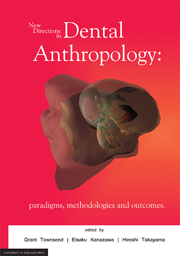Book contents
- Frontmatter
- Foreword
- Contents
- 1 Modelling the complexity of the dentition
- 2 New approaches to dental anthropology based on the study of twins
- 3 Genes for teeth — drawing inference from family data
- 4 Do feeding practices, gestation length, and birth weight affect the timing of emergence of the first primary tooth?
- 5 Sexual dimorphism in the primary and permanent dentitions of twins: an approach to clarifying the role of hormonal factors
- 6 Dental crown and arch size in Europeans and Australian Aboriginals
- 7 Sex determination from maxillary and mandibular canines of the Filipino population
- 8 Non-metric dental characteristics in Papua New Guinea Highlanders and their association with molar reduction
- 9 The Main Occluding Area between opposing teeth during chewing: a comparison between Australians and Japanese
- 10 “Mineral Maintenance” of dental structures in caries and erosive tooth wear: an holistic model
- 11 Emerging techniques for the analysis of tooth wear
4 - Do feeding practices, gestation length, and birth weight affect the timing of emergence of the first primary tooth?
Published online by Cambridge University Press: 05 May 2013
- Frontmatter
- Foreword
- Contents
- 1 Modelling the complexity of the dentition
- 2 New approaches to dental anthropology based on the study of twins
- 3 Genes for teeth — drawing inference from family data
- 4 Do feeding practices, gestation length, and birth weight affect the timing of emergence of the first primary tooth?
- 5 Sexual dimorphism in the primary and permanent dentitions of twins: an approach to clarifying the role of hormonal factors
- 6 Dental crown and arch size in Europeans and Australian Aboriginals
- 7 Sex determination from maxillary and mandibular canines of the Filipino population
- 8 Non-metric dental characteristics in Papua New Guinea Highlanders and their association with molar reduction
- 9 The Main Occluding Area between opposing teeth during chewing: a comparison between Australians and Japanese
- 10 “Mineral Maintenance” of dental structures in caries and erosive tooth wear: an holistic model
- 11 Emerging techniques for the analysis of tooth wear
Summary
ABSTRACT
Recent studies of twins have confirmed that there is a strong genetic contribution to variation in timing of primary tooth emergence. Although environmental factors, such as severe nutritional deficiency of the infant, may affect primary tooth emergence, the roles of other environmental factors remain unclear. This study aimed to determine whether newborn feeding practices, gestation length, and birth weight affect the emergence time of the first primary tooth. Data were collected from questionnaires and parental records as part of an ongoing longitudinal study of Australian twins and their families. The sample comprised 217 twin pairs. Most commonly, a mandibular central incisor was the first tooth to emerge, with the next being a maxillary central incisor. F-and t-tests were performed, comparing variables and mean values between groups, and statistical significance was set at p<0.05. No statistically significant difference was found in age at first primary tooth emergence between breast-fed and bottle-fed babies, with mean emergence times of 8.0 and 8.6 months respectively. Extremely premature infants (gestation <30 weeks) had a significantly later mean emergence time compared with infants born full-term (gestation ≥37 weeks) (10.7mo compared with 7.6mo). Significantly greater variation in timing was also observed with preterm infants. Very low birth weight babies (<1500g) also displayed a significant delay in tooth emergence compared with normal birth weight babies (>2500g) (10.1mo compared with 7.9mo). These findings indicate that the development of the primary dentition is well ‘protected’ against environmental disturbances, with only extreme prematurity or very low birth weight leading to significant delays in emergence.
- Type
- Chapter
- Information
- New Directions in Dental AnthropologyParadigms, Methodologies and Outcomes, pp. 35 - 45Publisher: The University of Adelaide PressPrint publication year: 2012
- 1
- Cited by



